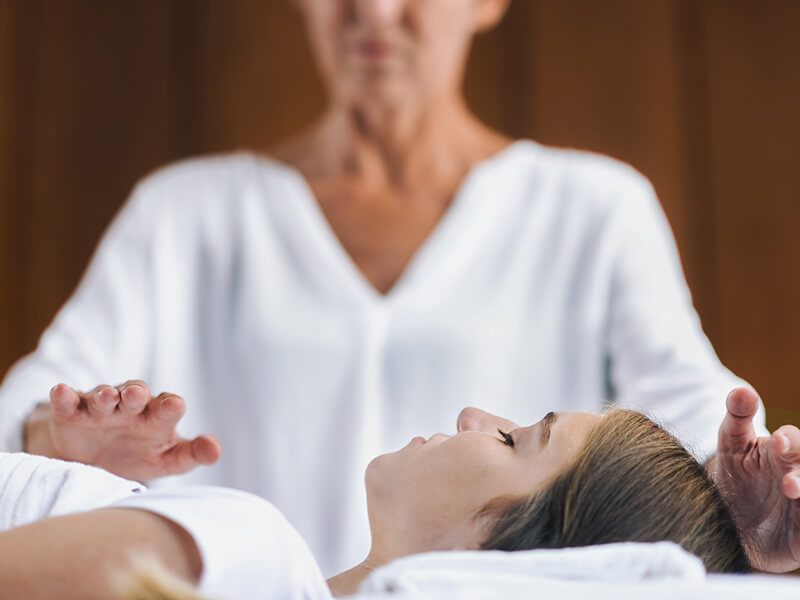Reiki is an energy-work modality rooted in Japanese holistic healing. Developed in the 1920s by Dr. Mikao Usui, Reiki blends spirituality with traditional healing practices to bring the energetic and physical bodies into alignment. This energy modality promotes the body’s natural ability to heal, brings balance to the energetic body, and supports overall health and wellbeing.
What To Expect
Reiki is performed on a fully clothed client who lays face-up on a massage table. The practitioner’s hands are lightly placed on or above various body areas, including the head, shoulders, arms, heart space, hips, legs, feet, and belly. Reiki can also be performed without physical contact. The practitioner channels reiki energy through the client’s body to clear energy blockages and encourage the body’s natural healing abilities. You may experience sensations of heat or cold emanating from the practitioner’s hands, pulsating sensations, deep relaxation, and feelings of peace, calm, and restoration.
Benefits
Reiki is purported to support the emotional, mental, and physical health of the client. It may offer deep relaxation, stress relief, anxiety relief, and relief from chronic or acute fatigue. Reiki clients have claimed that Reiki has diminished their fibromyalgia and other chronic pain symptoms, eased muscle tension and nerve pain, and reduced depression symptoms. Reiki can engage the parasympathetic nervous system, allowing the body to enter rest and relaxation mode and lowering blood pressure and heart rate.
Contraindications
Due to the non-invasive nature of Reiki, this modality can be performed on anyone regardless of a current medical condition. Accommodations can be made to ensure the client’s comfort on the massage table, including the use of bolsters, pillows, and blankets. This modality can be used as a complementary therapy to traditional medical interventions.
Frequency
As an energetic modality, Reiki can be received as often as is tolerated. Reiki practitioners often perform self-Reiki on a daily basis. Your Reiki practitioner will partner with you to create an appropriate treatment schedule to address your needs.
Side-Effects
Reiki is considered safe, with no contraindications. Side effects may include emotional release, sleepiness, increased gastrointestinal movement, headache, or nausea. These symptoms tend to resolve within hours of the session. Should you have any concerns, contact your Reiki practitioner.
Aftercare
Your body may need time to fully integrate the energetic healing that Reiki supports. You will want to focus on rest, relaxation, and self-care following your Reiki session. Avoid caffeine, alcohol, recreational drug use, and strenuous activity for the first 24 hours. You may wish to take an Epsom salt bath following your session or at the end of the day. Be sure to hydrate well and eat light meals following your session. Light activity such as restorative yoga can be performed the morning after your session. Be sure to follow up with your practitioner with any questions you may have regarding your healing process.
